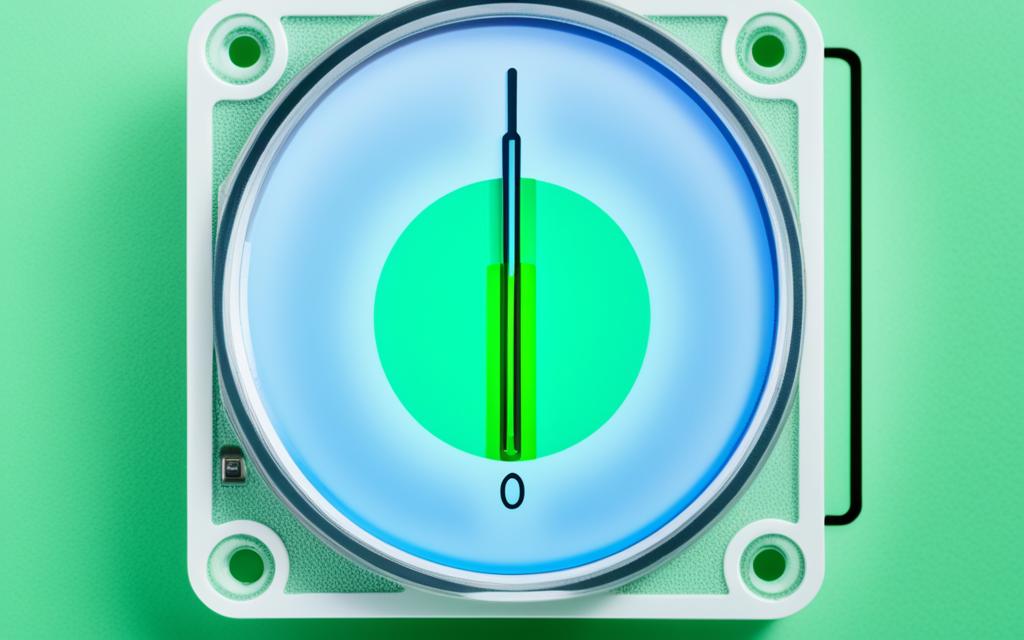Table of Contents
The CPU’s temperature is key to your computer’s health and how well it works. As modern CPUs get hot when used, knowing the best temperature for them is very important. When not doing much, the CPU’s temperature should be between 30°C (86°F) and 40°C (104°F). When the CPU works hard, its temperature may go up to about 70°C (158°F)1. However, if the temperature goes over 90°C, there’s a real risk of damage, especially if it goes above 100°C1. CPU overheating can lead to worse performance and shorten your hardware’s life.
Our guide will show you how to keep an eye on and control these temperatures. This will help keep your processor in good shape and make it last longer. For more detailed information, have a look at this comprehensive resource on managing CPU temperature.
Key Takeaways
- Monitor your CPU temperature, aiming for idle temperatures between 30°C to 40°C for optimal performance.
- Under heavy load, strive to keep your CPU temperatures below 70°C to avoid overheating.
- Indicators of overheating include performance throttling and system unresponsiveness.
- Regular cleaning of fans and components, as well as applying thermal paste, can greatly assist in maintaining lower temperatures.
- Consider your environmental factors; a cooler room can assist in keeping CPU temperatures manageable.
The Importance of CPU Temperature
Keeping your CPU temperature right is key for your computer’s performance and life span. High CPU temperatures can cause system crashes, lower performance, and even damage your hardware. It’s important to monitor your CPU’s health. This lets you stop overheating, especially when you’re gaming or editing videos.
CPUs usually work well between 40°C and 80°C under normal conditions. But, under heavy use, they can get between 60°C and 90°C. If the CPU’s temperature goes over 80°C during intense tasks, it’s vital to clear out dust and check that the cooling parts are working well2. Knowing these limits helps you keep the temperature in a safe range.
For effective CPU health monitoring, there are tools like HWMonitor, Core Temp, SpeedFan, and CPU-Z. These programs offer useful info for managing the CPU’s heat. Managing the heat well often involves applying thermal paste again and upgrading the cooling system based on the CPU’s needs3. If cooling isn’t enough, the CPU may slow down to stop overheating, which affects its performance during tough tasks.
What Should the CPU Temperature Be?
Knowing the right CPU temperature is crucial for keeping your computer running smoothly. The temperatures that are okay for your CPU can change a lot. This depends on how much work it’s doing and what kind of computer parts you have. It’s very important to know what temperatures are normal to make sure your computer doesn’t get too hot.
Good CPU Temperature Ranges
Most new CPUs work best when they’re between 40-60 degrees Celsius for typical tasks. But when you’re playing video games or using demanding programs, the temperature might go up to 70-80 degrees Celsius4. Fans and cooling systems are very important because they help keep the temperature down, especially when the computer is working hard.
Factors Affecting CPU Temperature
Several things can make your CPU hotter. Here are the most important ones:
- CPU Model: Different CPUs handle heat differently. For example, a 13th Gen. Core i9 can deal with almost 100 degrees Celsius when it’s really busy, but other CPUs might not handle heat as well1.
- Cooling Solutions: Good cooling systems keep your CPU cool. If they’re not good enough, your CPU might overheat.
- Ambient Temperature: The room’s temperature can affect your CPU’s temperature. A warmer room means a hotter CPU, so you’ll need a good cooling plan.
- Workload: What you’re doing on your computer (simple tasks vs. intense programs) can change how hot your CPU gets.
It’s important to keep an eye on these things to make sure your CPU stays at a safe temperature5.
How to Check CPU Temperature
Keeping your CPU at the right temperature is key to a long-lasting and smooth-running system. There are a few good ways to check your CPU’s heat levels effectively. We’ll look at how to do this through the BIOS, using special software, and by an infrared thermometer.
Using BIOS for Temperature Membership
To use the BIOS for checking CPU temperature, simply restart your PC and enter the BIOS setup. Here, you’ll find the temperature info you need. It’s a simple method that tells you if your CPU temperature is in a safe range.
Third-Party Software Options
For those who want to keep an eye on their CPU temperature all the time, software like Core Temp and HWMonitor is perfect. These programs give you real-time temperature readings. They can alert you if your CPU gets too hot during heavy use6.
Checking these readings regularly helps you know if your cooling system needs tweaking. It is an effective way to spot any possible issues early on.
Infrared Thermometer Method
Using an infrared thermometer is a fast and easy way to check CPU temperature. It’s a non-contact method that gives immediate temperature feedback. Just point the thermometer at the CPU, and you’ll know if things are heating up7. This approach is great for a quick temperature check without taking your computer apart.
Common Causes of High CPU Temperature
Knowing why CPUs overheat is key to keeping them running well and lasting long. Dust is a major reason for high CPU temperatures. It gathers inside the case, blocking air flow and cooling efficiency.
Dust Accumulation and Its Impact
Dust doesn’t just block fans and heatsinks; it also stops heat from escaping properly. Cleaning these parts often is vital. Doing so helps the CPU cool down effectively and prevents temperature spikes8. Keep the area clean and use filters to help your CPU work better and last longer9.
Poor Cooling Solutions
Poor cooling can be due to broken fans, not enough thermal paste, or parts not fitted right. Without good cooling, temperatures can jump over 80°C, harming the CPU8. Better coolers or more fans can improve air movement, removing warm air and keeping things cool10. It’s important to watch the CPU temperature to avoid damage.
Effects of Overclocking
Overclocking can really heat up your CPU, especially with high settings. This extra heat can cause problems. Temperatures above 85°C are dangerous for the CPU9 and might slow it down8. To keep it cool while overclocking, adjust the power and cooling accordingly10.
To wrap up, understanding what causes CPU overheating—like dust, poor cooling, and overclocking—helps us prevent it. Regular cleaning, using the right cooling methods, and being careful with settings are key to making your CPU perform its best and last longer9810.
Signs Your CPU is Overheating
Knowing when your CPU is too hot is key to keeping it safe. When it overheats, your CPU shows clear signs. It’s important for all users to keep an eye out for these.
Performance Throttling
If your CPU gets too warm, it might slow down to avoid damage. This is known as performance throttling. You might find your device struggling with simple tasks. By checking the temperature regularly, you can stop overheating. This helps your CPU work better for longer.
System Crashes or Unresponsiveness
When your system crashes a lot or apps don’t respond, your CPU could be too hot. This happens if it gets near dangerously high temperatures. Keeping your system clean and monitored can keep it running smoothly. Regular cleaning and monitoring prevent these issues.
How to Cool Down Your CPU
Keeping your CPU cool is key for good performance and long life. To cool your CPU well, you need a mix of strategies. They include better cooling systems, improved case airflow, and watching the room temperature.
Enhancing Cooling Systems
Upgrading your cooling is very effective. Liquid cooling systems are much better at removing heat than standard air coolers. Also, using new thermal paste between your CPU and cooler helps heat move better. It’s important to clean your cooling parts regularly to prevent overheating from dust build-up11.
Improving Case Airflow
Having good airflow in your case is crucial for cooling your CPU. Adding more case fans and making sure nothing blocks the airflow can really help. Also, making your CPU cooler fans run faster can keep temperatures down during heavy use1213.
Room Temperature Considerations
The temperature of your room can also impact your CPU. A cooler room helps keep your CPU’s temperature down. In some cases, you might need air conditioning to keep things cool and prevent overheating11.
FAQ
What is the ideal CPU temperature when idle?
The best temperature for a CPU at rest is between 30°C and 40°C. Staying within this range ensures your computer works well and lasts longer.
How can I identify if my CPU is overheating?
If your CPU gets too hot, you might notice your system slowing down, crashing, or freezing. Keep an eye on your computer to catch these signs early.
What factors can affect CPU temperature?
CPU heat can be influenced by the CPU type, the cooling system’s quality, room temperature, and how much work the CPU is doing. Dust can also block airflow, raising temperatures.
What should I do if my CPU temperature exceeds the normal range?
If your CPU gets too hot, improving cooling, enhancing airflow, and cleaning dust can help. It’s also smart to tweak your settings and steer clear of overclocking.
How often should I check my CPU temperature?
It’s good to check your CPU’s temperature often, especially if you use intensive programs like games or video software. Monitoring software can alert you to any heat issues.
Can an infrared thermometer help me monitor CPU temperature?
Yes, an infrared thermometer lets you quickly check your CPU temperature. It provides instant data to help you keep your CPU in the best shape.
What are effective cooling systems for CPUs?
High-quality heatsinks, liquid cooling, and good airflow in your computer case are key. These methods help keep CPU temperatures down and your system running smoothly.
Source Links
- https://community.spiceworks.com/t/what-is-a-normal-temperature-for-a-cpu-and-how-do-i-keep-it-low/948818 – What is a normal temperature for a CPU and how do I keep it low?
- https://www.linkedin.com/advice/3/what-normal-optimal-ranges-cpu-temperature-different – What are the normal and optimal ranges of CPU temperature for different types of processors?
- https://www.tomshardware.com/how-to/how-to-check-cpu-temp-temperature – How to Check Your CPU Temperature
- https://www.avast.com/c-how-to-check-cpu-temperature – How to Check and Monitor Your CPU Temperature
- https://www.lenovo.com/us/en/glossary/what-is-cpu-temperature/ – Cpu Temperature: What is CPU Temperature?
- https://www.wikihow.com/Monitor-CPU-Temperature – How to Monitor Your CPU Temperature: 4 Easy Tools
- https://www.rockpapershotgun.com/how-to-check-your-cpu-temperature – How to monitor your PC’s CPU temperature
- https://www.linkedin.com/advice/1/how-can-you-lower-your-cpu-temperature-too-high – How can you lower your CPU temperature if it is too high or overheating?
- https://www.reddit.com/r/AnthemTheGame/comments/arc5n0/if_you_have_high_cpu_usage_andor_temps_please/ – Reddit – Dive into anything
- https://www.linkedin.com/advice/0/what-common-causes-symptoms-cpu-overheating-skills-computer-repair – What are the common causes and symptoms of CPU overheating?
- https://www.crucial.com/support/system-maintenance-cooling – How to cool down your PC or Laptop
- https://www.xda-developers.com/how-to-lower-cpu-temperature/ – How to lower your CPU’s temperature
- https://www.digitaltrends.com/computing/how-to-lower-cpu-temperatures/ – How to lower your PC’s CPU temperatures, from easy to expert | Digital Trends








